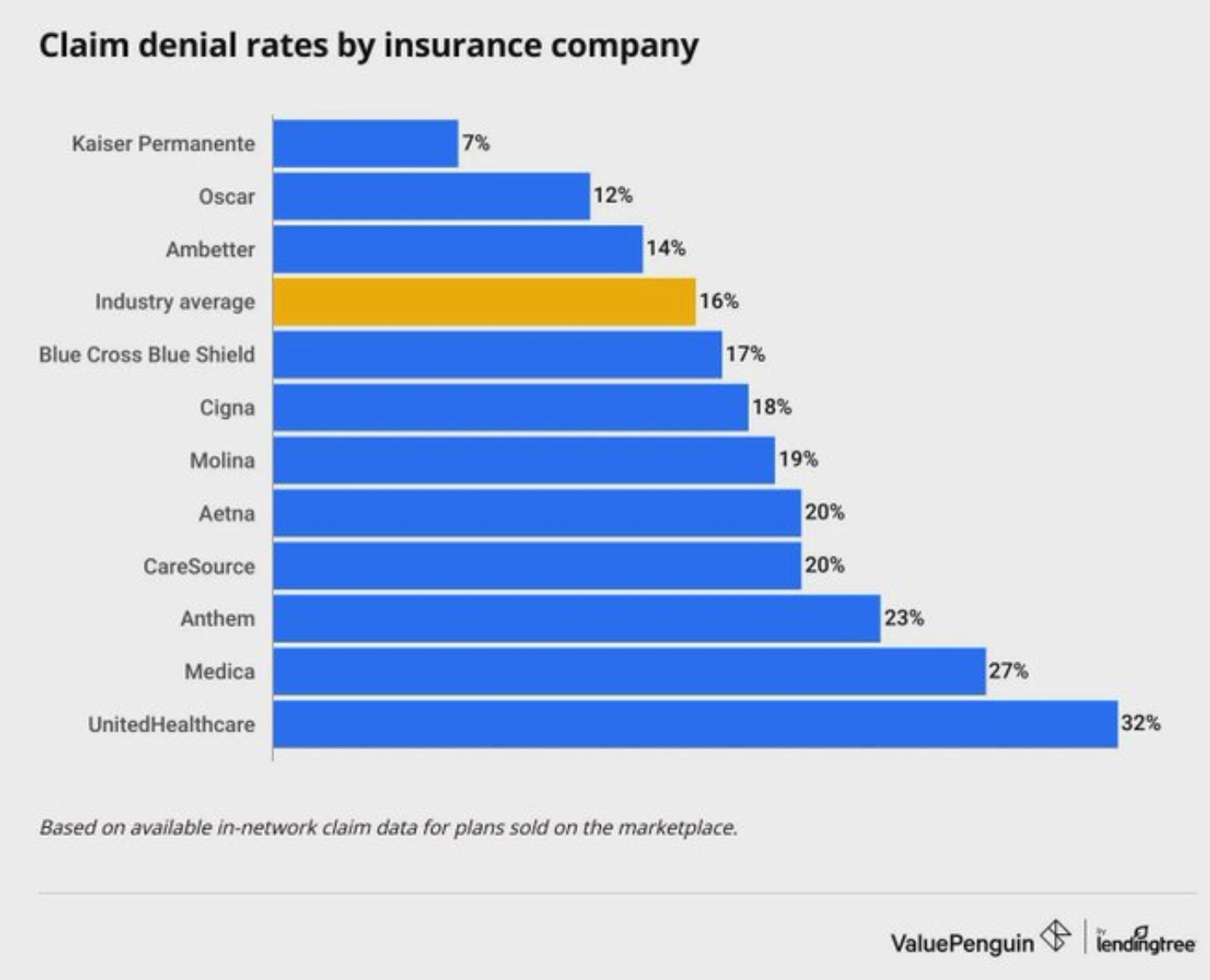LET THEM EAT DEDUCTIBLES
As UnitedHealthcare faces scrutiny over AI-driven claim denials and vulturous executive compensation, a dark spotlight illuminates American healthcare's deepening crisis.
HISTORY ALWAYS REPEATS ITS DARKEST LESSONS. Centuries ago, the most powerful built castle walls to separate themselves from the consequences of their decisions. Today, they build corner offices in glass towers, making life-and-death choices about healthcare coverage from behind standing desks and Bloomberg terminals, while ignoring their wives on line two.
But as Wednesday’s events in Manhattan showed us, even the highest corporate towers cannot shield their occupants when desperation reaches a breaking point.
In the wake of UnitedHealthcare CEO Brian Thompson being gunned down in midtown Manhattan, a stark spotlight illuminates the grotesque inequality at the heart of American healthcare — a system designed not to heal, but to transform human suffering into corporate profit.
While police haven’t yet revealed a motive behind Thompson’s killing, it comes at a time when UnitedHealthcare — the nation’s largest health insurance provider — faces mounting criticism over systemic denial of claims, leaving countless Americans to shoulder crushing medical debt or go without critical care entirely.
Over the summer of 2023, nearly a dozen protesters were arrested outside UnitedHealthcare parent UnitedHealth Group’s headquarters in Minnetonka, Minnesota. The demonstration, organized by People’s Action Institute, targeted the company’s systematic denial of necessary medical treatments — a practice that would soon face legal scrutiny as well.
Just this month, UnitedHealthcare was hit with a damning class-action lawsuit from families grieving their dead loved ones — victims of the company’s Medicare Advantage program. The suit centers on ‘naviHealth’, an AI-driven algorithm implemented under Thompson’s leadership in 2021 to make coverage decisions.
According to the lawsuit, the program had a shocking 90% error rate — calculated from denials reversed through appeals. Yet UnitedHealthcare continued using it, knowing that only 0.2% of patients would navigate the labyrinthine appeals process to overturn these deadly decisions.
And where did these algorithmically-denied claims manifest on the balance sheet? You know where. Right in the fucking profit column.
And those profits? Obscene.
Public financial records show that in 2022, UnitedHealth Group (the overall parent company) gorged itself on $324 billion in revenue while Americans rationed insulin and died from preventable diseases.
Their executives didn’t just earn money — they feasted on it. At the very top, UnitedHealth Group CEO Andrew Witty pocketed $58.4 million in 2022 alone. Meanwhile, Brian Thompson, as CEO of the UnitedHealthcare subsidiary, pulled in $10.2 million in salary, bonuses, and stock options, making him one of the company’s highest-paid executives.
Across the industry, the pattern of excess continued: Anthem Inc.’s CEO Gail Boudreaux clutched her $50 million, and Cigna’s former CEO David Cordani walked away with an obscene $79 million before stepping down.
The math is brutally simple: These blood-money profits come directly from denying care to the sick and dying. Insurance companies robotically reject an average of 15-20% of claims initially, often for services that actual healthcare providers — you know, the people who went to medical school — deem necessary.
However, as above, with UnitedHealthcare this figure is even higher denying approximately a third of all claims. This absolutely crushes those with chronic or complex conditions; the very people who need coverage most desperately.
And the result?
The explosion of medical crowdfunding platforms tells us everything we need to know about U.S. healthcare: We’ve created a system where your survival depends on how well you can market your suffering on social media. Hashtag, we’re fucked.
Medical fundraisers on GoFundMe have skyrocketed from 8000 to more than 200,000 annually in just nine years. Each campaign represents a family forced into an impossible choice between health and financial survival. These aren’t just statistics — they’re human beings caught in a system that has turned their right to live into a quarterly earnings report.
Thompson’s tenure at UnitedHealthcare was marked by particularly callous decisions, including a 2021 policy attempting to deny coverage for emergency room visits deemed *non-critical* after the fact. As the American Hospital Association pointed out, expecting patients to self-diagnose during what they believe is a medical emergency creates an impossible and dangerous situation. While the company eventually delayed this particular policy change, it exemplifies an industry-wide pattern of prioritizing shareholder value over human life.
So what do we do about it? The answer lies in fundamental systemic change that recognizes healthcare as a human right rather than a profit center. When people’s lives become commodities on a balance sheet, we’ve lost our way as a society. The growing desperation we’re witnessing isn’t just about healthcare — it’s the inevitable result of late-stage capitalism pushing people past their breaking point.
Yet let’s be crystal clear about what I mean when I say ‘fundamental systemic change’. It means ALL those within the system need to grow a fucking conscience.
It means healthcare executives need to look at their million-dollar paychecks and say perhaps I don’t need another dumbass yacht.
It means White House staffers watching genocide unfold on their watch need to say perhaps my CV is about as important as a Twitter blue checkmark and leave the administration at once — telling literally every news outlet that will listen why.
It means hospital board members need to stop nodding along while insurance companies label cancer treatments *experimental* — their wallets getting heavier with every death sentence they rubber stamp.
Because if the people operating the machinery of death and profit remain complicit, what changes?
When systems of power become too corrupt, too divorced from human suffering, the targets of public rage evolve. In feudal times, it was monarchs who faced the consequences of pushing their subjects too far. Just as Marie Antoinette’s infamous “let them eat cake” perfectly captured the aristocracy’s disconnection from reality, today’s healthcare executives telling desperate patients to “just meet their deductibles” reveals the same lethal contempt.
Today’s corporate executives, wielding power that would make medieval monarchs envious, seem to have forgotten these lessons of history. They’ve built their crystal towers higher than any castle wall, but they’re not as unreachable as they imagine. This isn’t a threat; it’s a clear historical observation.
As the gap between corporate excess and human suffering continues to widen, as more families lose loved ones to a healthcare system that treats their lives as mathematical equations, we may well see more desperate acts of retaliation — because a system that commodifies human life inevitably produces human responses.
The pressure cooker of late-stage capitalism keeps building steam, and historical precedent suggests it rarely ends well for those at the top.
Until we address these fundamental issues, we’ll continue seeing the human toll mount — in bankruptcies, in GoFundMe campaigns, in lives cut short by denied claims, and then also, in acts of desperation at the corporate overlords.
The question isn’t whether we can afford to change this system. The question is: How many more lives will be destroyed before we do? And how many more executives will find out the hard way that you can’t take your millions with you?







I've been saying this for years... Bravo to the executives who "did so well" that they eventually retire within bunkers that are hidden behind barbed wire fences and locked gates, while hiring 24/7 security in order to feel safe.
UHS used to be the insurance provider for AARP, which is when I canceled my membership in the organization and also the insurance. I honestly can’t remember why I canceled the insurance. Cost most likely. I was using them for Part D insurance and I found a company that charged no fee, as opposed to them. Their fee was hefty, as I recall. I couldn’t afford the services that AARP sells. Saw no point in continuing to pay. All I got was the magazine.
Frankly, seeing all the people my age in photos doing various things isn’t pleasurable. Getting really old just isn’t esthetically pleasing, even when they are the same age as me. I’m probably violating some kind of rule about being thrilled with being an old crone, but there you are. A feeling is a feeling.